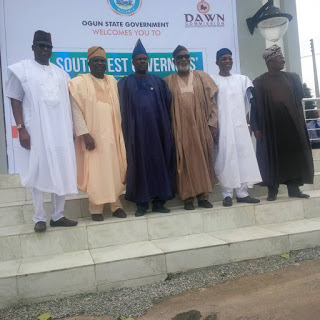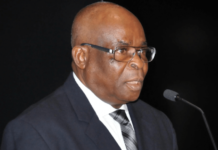 |
| Southwest Governors in a group photograph during the last meeting in Ogun state. |
There are no longer doubts as to whether or not regional integration will happen in the South-West. It is already happening. And it is making progress. All six governors of the region, comprising Lagos, Ogun, Oyo, Osun, Ondo, and Ekiti, deserve praise for putting partisan, religious, sub-ethnic, and egocentric sentiments aside to work together for the development of the region and the advancement of its people.

The integration project could be said to have fully taken off with the establishment of a commission in 2013, aptly named the Development Agenda for Western Nigeria. The DAWN Commission, as it has come to be known, was set up by the governments of the South-West states of Nigeria as the institutional and programme management body to promote the region’s integration agenda and ensure the delivery of the development aspirations of the entire region.
In the process, the commission seeks to mobilise “the collective strengths, assets and capabilities lying within the states of South-West Nigeria, towards achieving sustainable socio-economic growth and development that would result in high standard of living and improved well-being for the people of the region”.
The commission has a noble vision, namely, to develop the South-West region of Nigeria and make it the preferred place of choice for people to live, to work, to visit, and to invest in Africa. Its mission flows from this vision: “The attainment of an egalitarian, democratic and economically self-sustaining region that unlocks the energies and resourcefulness of her people for greater good and prosperity, while assuring their liberty and freedom”.
Following the establishment of the commission, the governors of the six states agreed to work cooperatively towards the development of the region. The present phase of their effort could be said to have begun in February 2016, when Ibile Holdings, the Lagos State Investment Company, was merged with the O’odua Investment conglomerate, which has an asset base worth over N70bn. Serious integration talks would follow in November 2016, when Governor Abiola Ajimobi of Oyo State hosted the South-West Governors’ Economic Forum in Ibadan on November 21, 2017.
At the end of the meeting, the governors adopted a progressive agenda, anchored on “the framework of a people-centred development strategy”, and agreed on quarterly meetings thereafter. Two such meetings have since been held in 2017, the first in Ado-Ekiti in February and the second in Abeokuta in July. The next meeting will be held in Lagos. Across the three meetings held so far, broad agreements were reached on a variety of programmes and projects, including education, agriculture, security, transport infrastructure, trade, commerce, and sports.
Themed, “Economic Self-Determination for Western Nigeria: the Export Alternative”, the July meeting took several far-reaching decisions, including (1) harnessing the competitive advantage of constituent states for sustainable regional development; (2) the establishment of a Western Nigeria Export Development Initiative (WENEDI) to drive the export potential of the region; (3) setting up a committee for the codification of Yoruba values and ethos as an instrument of uniqueness to strengthen Yoruba identity and unity of purpose; (4) convening a regional agriculture summit in Ibadan to enhance food security for the region; and (5) developing a revenue optimisation strategy for constituent states of the region. It was also decided that the forum would henceforth be known as the Western Nigeria Governors’ Forum.
Despite the self-warning by the governors to act, and not just talk, the DAWN Commission has been busy organising lectures, conferences, and summits, mostly at the dictate of the Governors’ Forum. True, a lot of ideas have to be generated as the basis for action, the people anxiously await concrete actions by the various governments that would translate the ideas generated so far to the improvement of their lives.
This leads to another observation: There has been minimal involvement of the people of the region beyond government officials and a select group of observers. True, the governors have good intentions; nevertheless, the people need to know when their assets are being moved and when serious decisions are being taken, which are intended to have a direct impact on their lives. It is, therefore, necessary for each state to hold town-hall meetings, at least one in each senatorial district, for informing stakeholders, for gauging their reaction to the integration project, and even for harvesting their suggestions.
It is unclear how much attention was given to health care in the various meetings. None of the communiques emanating from the meetings reflected whatever attention has been given to health care. Yet, this is an important area of social welfare that could seriously impact the quality of life in the region. Like education, the health sector is generally in jeopardy in the states, which is why those who can afford it go abroad for treatment, while those who can’t suffer and die.
Although much has been said about education, it remains unclear what direction the Forum is going. For example, in his welcome address at the Ado-Ekiti meeting of the Forum in February, Governor Fayose suggested a common curriculum across the states as we had during the hey days of the Obafemi Awolowo era in the old Western Region. Not much has been heard about this suggestion ever since.
How, for example, does the Forum plan to handle tertiary education, when some of the states have four or more higher institutions, some of which are hardly viable? What plans does the Forum have for reviving excellence in formerly outstanding secondary schools, such as the Government College, Ibadan; Christ School, Ado Ekiti; and Ondo Boys High School? In a recent conversation with Governor Ajimobi, he confirmed that the Old Boys Association of the Government College Ibadan has been given tremendous leverage in the running of the school. Are other governors in the region planning to do the same?
I have consistently advocated Yoruba integration as a necessary condition for Yoruba unity, because the former will provide the ideas, programmes, and projects around which to unite. It is well-known that historical, sub-ethnic, religious, and partisan differences have always impeded the march toward Yoruba unity, just as some of these factors initially affected the integration project. Now that Yoruba political leaders have agreed to unite for the development and progress of the region, the door is open for Yoruba unity. The challenge is open for other Yoruba leaders to follow their example.
It must be admitted that at least one Yoruba leader has made Yoruba unity the driving agenda of his reign. I mean the Ooni of Ife, Oba Adeyeye Eniitan Ogunwusi, Ojaja II. Now is the time to rally other Yoruba traditional rulers to work in tandem with the region’s Governors’ Forum.
Finally, the regional integration plan embarked upon by Yoruba governors should send a message to the various Yoruba socio-cultural groups and factions within them to unite if their primary interest is in the development of the South-West. Cacophonous voices are no longer needed, if regional integration and Yoruba unity are to be achieved as a twin project.
Niyi Akinnaso is a Professor at the Adekunle Ajasin University, Akungba Akoko, Ondo state.










